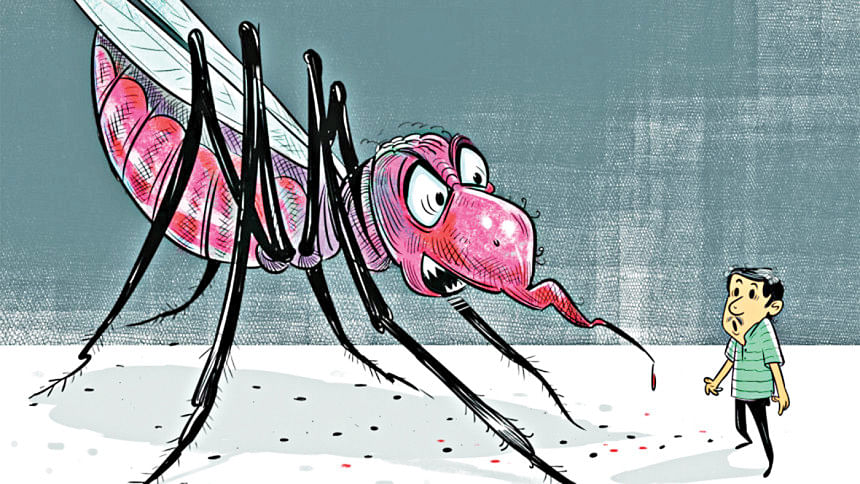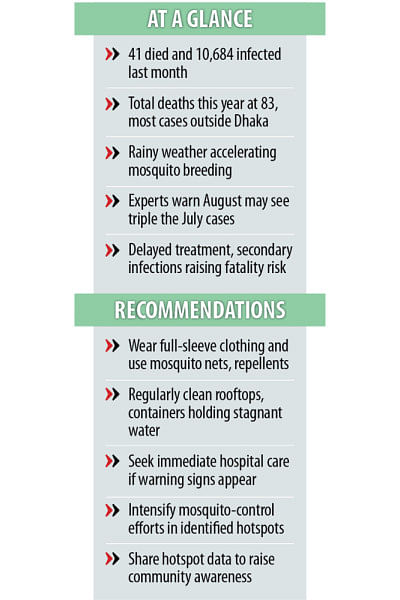Dengue deaths and infections double in July

The number of dengue deaths and infections in July more than doubled compared to the previous month, underscoring the growing severity of this year's outbreak.
According to the Directorate General of Health Services (DGHS), 41 people died of dengue in July, up from 19 in June. Reported cases surged to 10,684 last month, compared to 5,951 the previous month.
So far this year, 83 dengue-related deaths have been recorded, including 36 from outside Dhaka. The total number of cases has reached 20,980, with 16,412 reported from areas beyond the capital.
Health experts have warned that the current weather is highly conducive to the spread of Aedes mosquitoes, the primary vector of the disease, and have urged immediate action from the authorities.
The Bangladesh Meteorological Department (BMD) has forecast continued rainfall, which experts say could further accelerate dengue transmission. Between 9:00am on August 1 and the next three days, light to moderate rain and thunderstorms accompanied by gusty winds are expected in most parts of Dhaka, Mymensingh, Chattogram, and Sylhet divisions, as well as several other regions.

"Intermittent rain is highly favourable for the spread of dengue virus," said entomologist GM Saifur Rahman.
He said Aedes mosquitoes are more active in overcast weather, common during the monsoon, when dengue infections can rise up to ninefold compared to the dry season.
Saifur urged people to wear full-sleeve clothing, use mosquito nets and repellents, and regularly clean potential breeding sites such as rooftops and containers holding stagnant water.
He also pointed to several reasons behind the rising death toll. Many patients arrive at hospitals late, confused by overlapping symptoms of other viral fevers currently circulating in the city. This delay in seeking treatment often leads to severe complications or death. Secondary infections can also contribute to increased mortality, he added.
Saifur stressed the importance of intensified mosquito-control efforts in dengue hotspots and called for the destruction of adult mosquitoes and their breeding sites.
Jahangirnagar University entomologist Prof Kabirul Bashar said, "August could see at least three times as many dengue cases as July, with numbers rising further in September."
Bashar emphasised targeted vector control near patients' homes and in hospitals to prevent further transmission.
"Hospitals can become transmission hubs if Aedes mosquitoes bite infected patients and then others," he said.
Without active community participation in eliminating breeding grounds, controlling the outbreak will be extremely difficult, he warned.
Dr HM Nazmul Ahsan, associate professor at Shaheed Suhrawardy Medical College Hospital, said there has been a rise in patients suffering from Expanded Dengue Syndrome (EDS) this year.
"Patients with EDS often die suddenly due to severe complications involving multiple organs such as the liver, brain, heart, kidneys, and central nervous system," he said.
Those with underlying conditions -- such as diabetes, hypertension, or chronic lung and kidney diseases -- are particularly at risk.
"Many patients fail to recognise warning signs such as severe abdominal pain, difficulty breathing, bleeding, extreme fatigue, or a sharp drop in urination or platelet count. By the time they reach the hospital, their condition is often critical," Dr Ahsan said.
He advised immediate hospitalisation for anyone showing such symptoms.
"Many patients from outside Dhaka arrive too late, often without proper fluid management during transport. Early intervention could have saved many of them," he said.

 For all latest news, follow The Daily Star's Google News channel.
For all latest news, follow The Daily Star's Google News channel. 



Comments